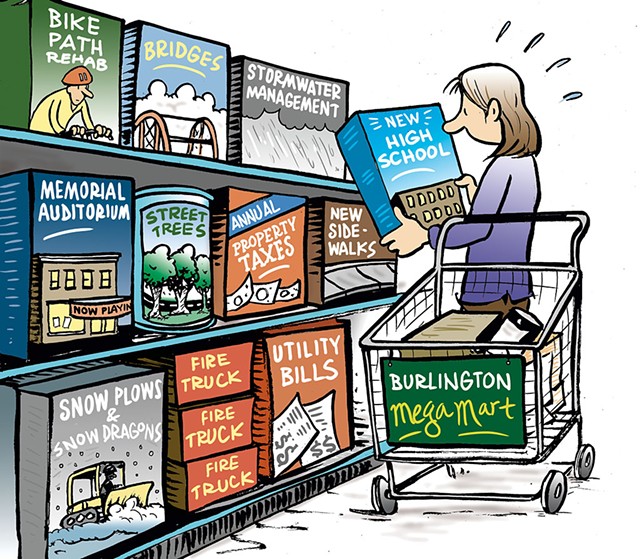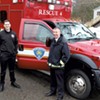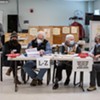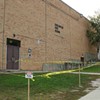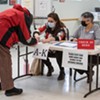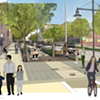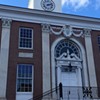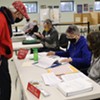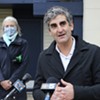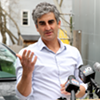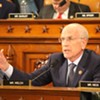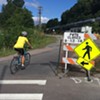Switch to the mobile version of this page.
Vermont's Independent Voice
- News
- Arts+Culture
- Home+Design
- Food
- Cannabis
- Music
- On Screen
- Events
- Jobs
- Obituaries
- Classifieds
- Personals
Browse News
Departments
-
Education

Scott Official Pushes Back on Former State…
-
News

Burlington Budget Deficit Balloons to $13.1 Million
-
Education

Senate Committee Votes 3-2 to Recommend Saunders…
- Court Rejects Roxbury's Request to Block School Budget Vote Education 0
- Norwich University Names New President Education 0
- Media Note: Mitch Wertlieb Named Host of 'Vermont This Week' Health Care 0
Browse Arts + Culture
View All
local resources
Browse Food + Drink
View All
Browse Cannabis
View All
-
Culture

'Cannasations' Podcaster Kris Brown Aims to 'Humanize'…
-
True 802

A Burlington Cannabis Shop Plans to Host…
-
Business

Judge Tosses Burlington Cannabiz Owner's Lawsuit
-
Health + Fitness

Vermont's Cannabis Nurse Hotline Answers Health Questions…
-
Business

Waterbury Couple Buy Rare Vermont Cannabis License
Browse Music
View All
Browse On Screen
Browse Events
Browse Classifieds
Browse Personals
-

If you're looking for "I Spys," dating or LTRs, this is your scene.
View Profiles
Special Reports
Pubs+More
On Town Meeting Day, Burlington Voters Will Again Consider New City Spending — and a Tax Hike
Published February 23, 2022 at 10:00 a.m.
Burlington voters will consider approving a higher municipal tax rate when they cast ballots this Town Meeting Day, the first proposed rate hike in three years.
Mayor Miro Weinberger says the 4-cent increase will help close a projected $7 million budget hole created by historically high inflation, new spending and pandemic-related revenue shortfalls.
A $23.8 million capital bond on the ballot also asks taxpayers to spend more. The bond would pay for sidewalks and the purchase of new fire trucks, among other things, and is a slimmed-down version of a $40 million bond that failed in a special December election. Meanwhile, a $25.9 million plan to fix up six blocks of Main Street is also on the ballot, but it would not increase taxes since the debt would be repaid with other revenues.
If passed by a two-thirds majority of voters, the capital bond would cost the owner of a median-priced home — about $380,000 — an additional $36 in fiscal year 2023 and $89 when the cost peaks in 2025. The 4-cent general tax rate increase, which requires a simple majority to pass, would cost the same homeowner about $150 more in property taxes in 2023.
Weinberger said a state surplus in the education fund could provide relief that would actually decrease taxes overall. But that depends on the legislature, and voters won't know for certain before they head to the polls; Burlington started mailing ballots earlier this month, and Town Meeting Day is on Tuesday, March 1.
As in December, some residents are wary of saying yes to higher taxes. Many are still reeling from last year's citywide reassessment, which left most homeowners with a higher tax bill. But Weinberger said the spending will keep city services intact and address deferred maintenance that will become costlier the longer it's ignored.
"If you like the variety and the level of services the city provides and don't want to see that change, we need to change the tax rate," Weinberger said, adding that voting down the capital bond would put more pressure on future budgets. "People need to understand there will not be major savings as a result of a 'no' vote."
Inflation is by far the biggest driver of the city's budget woes, accounting for $5.25 million of the anticipated $7 million gap. The cost of goods and services in the U.S. has risen by 7.5 percent since January 2021, which has made it more expensive for the city to purchase supplies and materials and to provide employee benefits. The city is also in the midst of bargaining four union contracts that expire in June and is expecting to pay larger cost-of-living increases than in previous years, the mayor said.
The city also wants $1.75 million to pay for "equity investments" meant to address systemic inequality. That spending, currently funded by federal money, includes paying seasonal workers more; compensating board and commission members; and adding seven staffers to the city's Office of Racial Equity, Inclusion and Belonging. The new positions — which include an anti-racism curriculum manager and two public health equity staffers — account for $1.25 million of the budget gap.
Created in September 2019, the office will soon lose its director, Tyeastia Green, who plans to resign as of March 10. Green began her two-year tenure as the office's sole employee; now she oversees an office of 14.
If approved, the 4-cent tax increase would collect $2.2 million. To raise the rest of the needed $7 million, the city would use $1.2 million in federal coronavirus relief cash and $3.5 million in revenue from sources such as building and event permits, as well as inspection fees that Weinberger expects will bounce back as the pandemic winds down. The city will set aside additional recovery funds as a backup.
If voters pass the $23.8 million capital bond, the city would pair it with about $111 million in state and federal grants, federal infrastructure dollars, and other sources to complete a lengthy list of projects. A $4 million chunk would go toward fixing up city buildings such as fire stations, the BCA Center on Church Street and Fletcher Free Library. But even that would only address a fraction of the need, officials say.
If the bond fails, the city estimates that it would spend $500,000 a year on emergency repairs, the equivalent of adding 1 cent to the tax rate.
Memorial Auditorium would receive $1 million, a vast reduction from the $10 million the city hoped that voters would approve in December for the decrepit building. The money would be used to heat the structure and pay for various assessments that would help determine its future use. Other portions of the bond money would rehab aging sidewalks, fix up city parks, and match state and federal grant funds for transportation projects.
The impact of the two ballot items on taxpayers could be less if the city found other funding sources between now and when the budget is approved in June, or if the costs of services were lower than expected. In that case, the tax rate increase could end up being less than 4 cents, Weinberger said, noting that the city hasn't always used its full taxing authority in the past.
"It is one of our most significant responsibilities to be very careful with the taxpayers' dollars," he said. "We don't spend their money unless we have to."
Weinberger says an anticipated 7 percent reduction in the education tax would offset the city's tax increase and actually result in an overall tax decrease. In that scenario, school officials say the district's $98.2 million school budget would cost the average homeowner about $300 less year over year — even though it represents a 13.1 percent increase in per-pupil spending.
But that calculation is based on a scenario that's anything but certain. The 7 percent dip relies on the state applying its entire $90 million surplus in the education fund toward property tax relief. Gov. Phil Scott, though, has recommended using only $45 million for that purpose.
In December, state education officials suggested that school districts be conservative in estimating tax rates by assuming that none of the surplus would be used for tax relief, according to emails obtained by Seven Days.
Burlington school officials did the opposite. The school budget item on the ballot even includes a statement that its spending plan "could produce" a lower tax rate.
Will Senning, director of elections for the Vermont Secretary of State's Office, said such language could "possibly implicate" a state statute that bars "improper influence" of voters, but that a court would have to decide the matter. He said his office doesn't have jurisdiction over local elections.
Burlington School District superintendent Tom Flanagan defended the ballot language, saying the district has included tax rate estimates on previous ballots. He said officials have been clear about how the uncertainty around the education fund surplus could affect local tax rates.
"We felt it was appropriate to include this language because this year it is more challenging to succinctly describe how the District's budget will impact the community," Flanagan said in a written statement. "We feel this gives voters a better understanding by providing more information."
Leslie Delaney, a 38-year city resident, isn't reassured by Flanagan's explanation and said she's appalled that the city is "selling" its tax increase on the premise that school taxes might go down. Delaney said she could pay for a tax increase, but she's concerned that the city is becoming unaffordable for many, especially with a large bond to build a new high school expected on the ballot in November.
Delaney wouldn't share how she'll vote on the tax increase, though she did say she's conflicted about the capital bond. She supports buying fire trucks and an emergency service radio system but wonders why the city is seeking money for sidewalks when voters approved millions for those upgrades in 2016. (City officials have said that previous bond covered five years of sidewalk repairs, and more are needed.)
"I wish it was a line item [vote], because I would like to vote for those," Delaney said of the public safety items. "I will have to seriously weigh what they put in with it."
Old North End resident Doug Hoffman questioned the timing of the vote, saying people are still shell-shocked from the property reassessment. He suggested that the city put off some of its spending; he plans to vote against both ballot items.
"Down the road, it might cost a little more, but they keep asking the people to make sacrifices for their plans, and I'd like to see the city make some sacrifices sometimes for us," Hoffman said.
Abbey Duke, a New North End resident, plans to vote for both ballot items because she thinks the city needs to keep up with inflation, pay city workers a livable wage and upgrade failing infrastructure. Duke is concerned about the cost of living in Burlington but said the issue isn't solved by "nickel and diming" the city.
"I understand the reaction that people have of feeling like an increase in taxes in this climate is not affordable, but I think we will only pay for it down the road if we don't invest now," Duke said.
Weinberger agreed that a "no" vote would be costly. Instead of financing fire trucks and the radio system over the bond's 20-year life span, the city would have to lease the equipment for a shorter period at a higher cost. Without matching grant funds from the bond, the city would have to build them into the general fund, the mayor said — which would mean higher taxes.
And that's just one ballot item. If the tax rate vote fails, too, the city would have to comb every department's budget for cuts.
"Everything will be on the table," Weinberger said. "It will not be a catastrophe, but it will be a major challenge."
The original print version of this article was headlined "Take Two"
Related Stories
Got something to say?
Send a letter to the editor
and we'll publish your feedback in print!
More By This Author
About The Author

Courtney Lamdin
Bio:
Courtney Lamdin is a news reporter at Seven Days; she covers Burlington. She was previously executive editor of the Milton Independent, Colchester Sun and Essex Reporter.
Courtney Lamdin is a news reporter at Seven Days; she covers Burlington. She was previously executive editor of the Milton Independent, Colchester Sun and Essex Reporter.
Speaking of...
-

Burlington Budget Deficit Balloons to $13.1 Million
Apr 25, 2024 -

The Café HOT. in Burlington Adds Late-Night Menu
Apr 23, 2024 -

Burlington Mayor Emma Mulvaney-Stanak’s First Term Starts With Major Staffing and Spending Decisions
Apr 17, 2024 -

Totally Transfixed: A Rare Eclipse on a Bluebird Day Dazzled Crowds in Northern Vermont
Apr 10, 2024 -

Middlebury’s Haymaker Bun to Open Second Location in Burlington’s Soda Plant
Apr 9, 2024 - More »
Comments
Comments are closed.
From 2014-2020, Seven Days allowed readers to comment on all stories posted on our website. While we've appreciated the suggestions and insights, right now Seven Days is prioritizing our core mission — producing high-quality, responsible local journalism — over moderating online debates between readers.
To criticize, correct or praise our reporting, please send us a letter to the editor or send us a tip. We’ll check it out and report the results.
Online comments may return when we have better tech tools for managing them. Thanks for reading.
- 1. Scott Official Pushes Back on Former State Board of Ed Chair's Testimony Education
- 2. Burlington Budget Deficit Balloons to $13.1 Million News
- 3. Home Is Where the Target Is: Suburban SoBu Builds a Downtown Neighborhood Real Estate
- 4. Legislature Advances Measures to Improve Vermont’s Response to Animal Cruelty Politics
- 5. A Former MMA Fighter Runs a Wildlife Rehabilitation Center in Cabot News
- 6. Vermont Rep. Emilie Kornheiser Sees Raising Revenue as Part of Her Mission Politics
- 7. Senate Committee Votes 3-2 to Recommend Saunders as Education Secretary Education
- 1. Totally Transfixed: A Rare Eclipse on a Bluebird Day Dazzled Crowds in Northern Vermont 2024 Solar Eclipse
- 2. Zoie Saunders, Gov. Scott’s Pick for Education Secretary, Faces Questions About Her Qualifications Education
- 3. Don't Trash Those Solar Eclipse Glasses! Groups Collect Them to Be Reused 2024 Solar Eclipse
- 4. State Will Build Secure Juvenile Treatment Center in Vergennes News
- 5. Vermont Awarded $62 Million in Federal Solar Incentives News
- 6. Queen of the City: Mulvaney-Stanak Sworn In as Burlington Mayor News
- 7. New Jersey Earthquake Is Felt in Vermont News


























